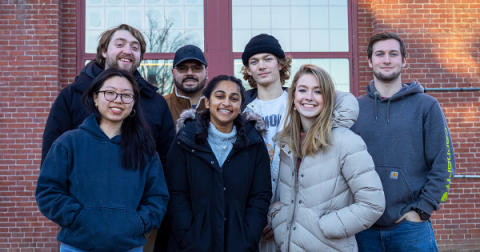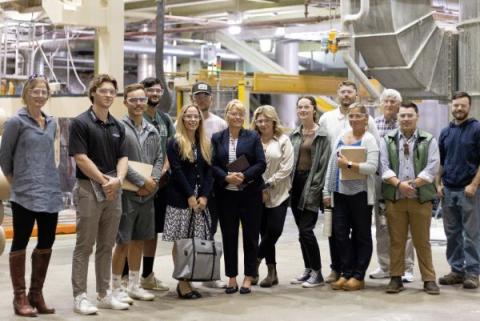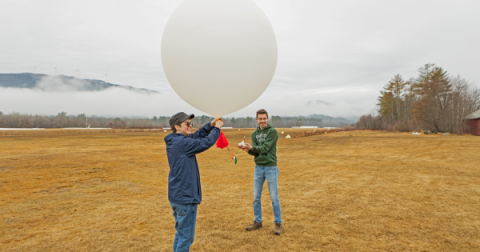A Better Way of Learning
Cluster Learning powers our unique and integrated academic environment. It’s all about focusing on learning as a process!
Our courses focus less on final products and more on helping you learn how to learn, how to take risks in your learning, and how to find, understand, and use academic knowledge to help you reach your life and career goals.
Cluster Learning breaks down boundaries between disciplines, between the classroom and “the real world,” and between teacher and student so that we are all learners, who—together—can change the world.
At Plymouth State, you’ll tackle real-world issues and problems that you care about through personal and professional opportunities that prepare you for lifelong success.
High-Impact Learning

“It’s been a great experience working with PSU’s Marketing and Design Agency class. The students are excited to work in marketing, and they have created top-notch content for us to use.”
— Gunstock Mountain Resort’s Sales and Marketing Director
Researching Sustainable Opportunities
“This is a perfect example of Cluster Learning in action. Students are gaining critical hands-on experience while building a network of contacts they’ll need to work and succeed in the real world.”
— President Donald L. Birx

Providing Professional Consulting Services

“There is a real sense of pride and accomplishment when our students pitch their ideas and then bring them to fruition.”
— Business Professor Denise Hutchins
Cluster Learning is in Fashion
“I have been able to learn about the entire business side as well as the design side of a company and that is very different from your usual merchandising and marketing major.”
— Camilla Puzio ’24

NASA Solar Eclipse Project

“I am excited about the research, and this is also a huge opportunity for artists to get noticed and for our community to learn about what scientists are doing.”
— Emily Roy ’24
More Success With Less Stress
“Roughly 90 percent of every task I complete as an educator starts with a question that I must generate and refine to solve a specific problem or improve on something. Having had that experience (at PSU) makes this process feel familiar and leads me to more success with less stress.”
— Griffin Nyhan ’20

What are Clusters?
- Cluster Learning, a faculty-designed pedagogical approach that emphasizes interdisciplinarity (integrating across and beyond academic disciplines), open education (increasing students’ access to both knowledge and knowledge creation), and project-based learning (learning through sustained, applied projects). Faculty are involved in significant professional development to engage in various ways with these approaches across all PSU courses.
- The HoME (Habits of Mind Experience) program, our signature general education program that focuses on purposeful communication, problem-solving, integrating perspectives, and self-regulated learning. The Habits of Mind are deeply connected to Cluster Learning and serve as the outcomes at the core of Cluster Learning. As part of HoME, all PSU students take “Tackling a Wicked Problem” and the “Integrated Capstone.” These two courses provide the bookends for the Cluster experience; they are interdisciplinary, project-based courses that engage Open Educational Resources (OER) as core texts, and that focus squarely on the Habits of Mind.
- Our majors are also deeply involved in the Cluster Model. When we create new majors that emphasize interdisciplinary connections across academic domains, we now call them Cluster Majors. Since we rolled out the Cluster Model, faculty have been inspired to create several new Cluster Majors, including climate studies, digital music production and entrepreneurship, forensic science, game design, robotics, and sustainability studies. Our first and enduring “Cluster Major” is our interdisciplinary studies major, which allows students to customize new paths across multiple fields as guided by their own curiosity and career goals. Students in more traditional majors still participate in the integrating energy of Cluster Majors when they come together with other students from other majors in their Integrated Capstone, putting their expertise to work as part of an interdisciplinary team.
- Our administrative structure has also taken a page from the Cluster Model. Previously organized by departments, we now have more integrated “Academic Units,” which groups families of programs together under larger umbrellas for the administrative work of budgeting, class scheduling, promotion and tenure, and other operations. This allows our faculty to work more closely with their colleagues and diminish the siloization effect that the more granular department structure tended to have.
- Our co- and extra-curricular offices have, where appropriate, also adopted the language and philosophies of the Cluster Model.
- Clusters are based on the belief that in today’s world you not only need a core focus but must be able to synthesize, converse with, and engage in a team-based environment across disciplines.
- Clusters acknowledge that most discoveries are being made between disciplines or result from a synthesis of ideas and concepts from many areas.
- Clusters are a format for experimental and self-directed learning based on real world issues and applications.
- Clusters involve a new pedagogy and approach to learning, incorporates and is embodied in the Habits of Mind:
- Problem solving
- Integrated perspective
- Self-directed learning
- Purposeful communication
- Clusters are a new way to learn based on the needs of the 21st century and are built on the realization that information and data are now readily available, partners are everywhere, and the challenges are complex and multidisciplinary.
- Clusters are based on the findings and recommendations of the national academies of Science and Engineering.
- Clusters support the belief that knowledge is changing and growing so fast that rather than pounding in everything we know today, our goal should be to create a framework and skill set that students can build on throughout their whole career.
- This is a skills-based approach that implements the best practices of the business and industry, professions, and graduate school recommendations and needs.
- PSU is a leader in this field and has literally written the book on reinvention of higher education.
- Clusters help us design our strategic focus and eventually will evolve into five to seven program families.
- Cluster majors and Interdisciplinary studies are the embodiments of cross-disciplinary skills development that often focus on key challenge areas. Currently we have six Cluster majors: Climate, Sustainability, Forensics, Game Design, Robotics, and Digital Music, with the ability for everyone to create their own major.
- Clusters do not replace majors, they strengthen them and emphasize cross disciplinary discovery and integration, applications, and problem-solving skills.
- Clusters are built on underlying disciplines and structurally supported by academic units.
- Clusters often employ open-source resources for both knowledge discovery and creation (often reducing the cost of textbooks and increasing the relevance and timeliness of information).
- We have seven Cluster focal areas: Exploration and Discovery, Innovation and Entrepreneurship, Arts, Humanities, and Technology, Tourism and Environmental Sustainability, Education Democracy and Societal Change, Justice and Security, and Health and Human Enrichment.
- Clusters have four experiences, a Wicked Problem class upon entry, followed by an Integrative Capstone in the junior or senior year, Integrative Skills Development built around your major, and Open Laboratory experiences based on real world design and development opportunities.
- Clusters are a movement to reintegrate the liberal arts, technology, and science.
- Clusters were born in the environments of innovation, creativity, and real-world practice, and are driven by the need to recreate education to provide leaders, cross disciplinary thinkers, and entrepreneurs for the future based the way we now work, live, and learn throughout our lifetimes.
We asked Artificial Intelligence (AI) to define PSU's Cluster Learning concept and it generated the following solid definition:
The Cluster Model at Plymouth State University is a transformative approach to education that emphasizes collaborative, multidisciplinary work transcending individual disciplines. It is designed to prepare students for the challenges of the 21st century by engaging them in real-world projects that address complex societal issues. Through the Integrated Cluster Learning Model, students work with diverse teams from various backgrounds, partnering with local communities and organizations to create a more efficient, equitable, and forward-thinking ecosystem of ideas. This model blends practice with innovation, providing students with hands-on experience and a skill set sought after by future employers, fostering critical thinking, collaboration, and career readiness.

